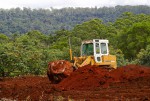News
2016-08-11 | permalink
Agriculture and overexploitation main drivers of species loss, study
 Habitat conversion is a threat to species (Photo: CC0)
Habitat conversion is a threat to species (Photo: CC0)
Agriculture and the overexploitation of plants and animal species are more significant drivers of biodiversity loss than climate change, according to new research published in the journal Nature on August 11th. The team led by scientists from the University of Queensland, Australia found that almost three-quarters of the world’s endangered species faced these threats, compared to just 19% affected by climate change. “Addressing overharvesting and agricultural activities are key to turning around the biodiversity extinction crisis,” said lead author Sean Maxwell of the University of Queensland. “This must be at the forefront of the conservation agenda.” Together with the Wildlife Conservation Society and the International Union for the Conservation of Nature (IUCN), the researchers assessed 8,688 near-threatened or threatened species on the IUCN’s “red list”. They quantified information for 11 threats: overexploitation, agricultural activity, urban development, invasion and disease, pollution, ecosystem modification, climate change, human disturbance, transport and energy production. The analysis showed that 72 per cent or 6241 species were overexploited, meaning that the harvesting of species from the wild happened at rates not compensated for by reproduction or regrowth, for example through logging, hunting, fishing or gathering species from the wild. These included the Sumatran rhinoceros, western gorilla and Chinese pangolin – all illegally hunted for their body parts and meat. Some 5,407 species or 62% were threatened by agriculture alone. Africa’s cheetah, Asia’s hairy-nosed otter and South America’s huemul deer are among the animals most affected by crop and livestock farming, timber plantations and aquaculture. However, the authors underlined that there are effective tools and approaches to alleviate harm caused by overexploitation and agricultural activities. “History has taught us that minimising impacts from overharvesting and agriculture require a variety of conservation actions but these can be achieved,” said co-author Associate Professor James Watson. “Actions such as well managed protected areas, enforcement of hunting regulations, and managing agricultural systems in ways that allow threatened species to persist within them all have a major role to play in reducing the biodiversity crisis,” he added. Other measures recommended by the authors are the establishment of protected areas to safeguard key biodiversity areas; the regulation of pesticide and fertilizer use and the certification of agricultural sustainability. “These activities need to be well funded and prioritised in areas that will reduce threat,” said James Watson. (ab)

